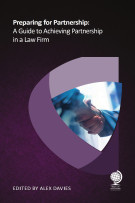On the Path to Wellbeing in the Legal Profession
10 June 2021

Bree Buchanan, JD, MSF, is the Board President of the Institute for Wellbeing in Law (formerly known as the National Task Force on Lawyer WellBeing), and co-author of Lawyer Health and Wellbeing: How the Legal Profession is Tackling Stress and Creating Resiliency and The Path to Lawyer Wellbeing: Practical Recommendations for Positive Change. She served as Chair of the ABA Commission on Lawyers Assistance Programs from 2016-2019. Bree is a senior advisor for Krill Strategies, LLC.
Bree Buchanan, Board President of the Institute for Wellbeing in Law, discusses the effects of 2020 looking at the future of wellbeing in the legal profession with the need to bring in positive change.
The Wellbeing in Law Movement is Launched
Five years ago, a small independent group of impassioned US lawyers set out to systemically address the behavioral health impairments and general lack of wellbeing plaguing the legal profession. Inspired by the 2016 study that revealed the disproportionate rates of depression, anxiety, and problematic drinking among lawyers, they founded the National Task Force on Lawyer WellBeing with a mission of bringing about a cultural shift across the profession as a means to address these issues. Their acclaimed 2017 report, The Path to Lawyer WellBeing: Practical Recommendations for Positive Change (the “Report”), contained 44 recommendations to the profession’s stakeholder groups that created a guideline for bringing about this transformation.
The Report inspired creation of the ABA’s WellBeing Pledge Campaign (with 212 signatories to date), and 32 state multi-stakeholder wellbeing initiatives or task forces focused on their own states’ priorities, policies, and practices that inhibit the personal wellbeing necessary for professional success. By 2019, the profession seemed poised to undertake needed steps to address the lawyer wellbeing crisis.
And Then Came 2020
For those of us working in the ‘wellbeing in law’ movement, we knew our cause was important. We could never have anticipated, however, the simultaneous series of national and global crises that would bring into such stark relief this need for change. The compounding crises of the COVID-19 pandemic, racial justice reckoning, and environmental disasters essentially acted as accelerants to the behavioral health problems that were already too prevalent among lawyers.
Published studies of the pandemic’s impact on members of the legal profession are scant at this time; however, several give us a glimpse into our increasing distress. For example, burnout (a degrading emotional and physical state in which demands consistently exceed one’s resources) is on the rise. In June 2020, the Association of Corporate Counsel polled its members and found that 75% were experiencing moderate to exceedingly high levels of burnout. Half of the respondents were experiencing sleep problems and chronic fatigue, and almost a quarter disclosed an increased use of substances.
Unfortunately, the effects of the pandemic seem to fall particularly heavy upon the shoulders of women and people who identify as belonging to an ethnic minority. A large study conducted in the fall of 2020 (published May 2021) looked at gender-specific risk factors for mental health problems and attrition. The authors found that women in the profession are experiencing meaningfully worse mental health than men and drinking more hazardously. Alarmingly, a quarter of women are contemplating leaving the legal profession due to mental health, burnout, and stress.
In April 2020, the International Bar Association published findings from its global study of lawyer wellbeing. Data showed that lawyers belonging to an ethnic minority have wellbeing scores significantly below the global average. These people are more likely to report experiencing depressed thoughts, emotional upset, and relationship problems because of work-related wellbeing issues. They also report more barriers to discussing these issues with employers – especially their fear of not being believed and a lack of confidence in HR protocols.
The Future of Wellbeing in our Profession
In response to this secondary pandemic of mental health concerns, authors of the National Task Force Report formed the Institute for WellBeing in Law in December 2020. A think tank dedicated to shaping a profession where all members thrive, the nonprofit will advance its mission through research, scholarship, advocacy, and gold standard programming. The latter includes the popular WellBeing Week in Law. Held annually in May, the event features daily webinars and activities that relate to the multiple dimensions of wellbeing.
As we move towards recovering and rebuilding from the challenges of the last year, we should claim this as an opportunity to bring about shifts that can eliminate unnecessary suffering and alienation among our law students, lawyers, and judges. Every person – at every level – has a role to play in this effort. What will you do? Stay in touch and let IWIL know what you are doing to improve our profession.
Bree Buchanan, JD, MSF, is the Board President of the Institute for Wellbeing in Law (formerly known as the National Task Force on Lawyer WellBeing), and co-author of Lawyer Health and Wellbeing: How the Legal Profession is Tackling Stress and Creating Resiliency and The Path to Lawyer Wellbeing: Practical Recommendations for Positive Change. She served as Chair of the ABA Commission on Lawyers Assistance Programs from 2016-2019. Bree is a senior advisor for Krill Strategies, LLC.













Any comments - send us an email